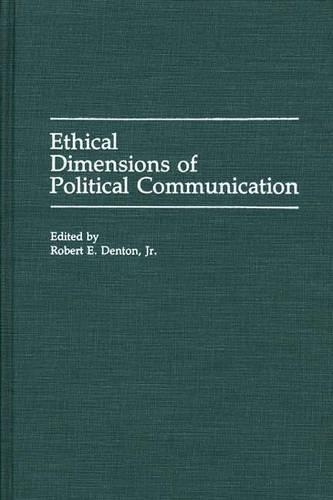
Ethical Dimensions of Political Communication
(Hardback)
Available Formats
Publishing Details
Ethical Dimensions of Political Communication
By (Author) Robert E. Denton
Bloomsbury Publishing PLC
Praeger Publishers Inc
20th September 1991
United States
Classifications
Tertiary Education
Non Fiction
Communication studies
Media, entertainment, information and communication industries
172
Physical Properties
Hardback
264
Description
Focusing specifically on political communication ethics in the USA, this book brings together a group of works which address ethical concerns related to political communication, including political culture, campaigns, media, advertising, ghostwriting, discourse, politicians and new technologies. All of the contributors raise questions and discuss various methods, criteria and issues for exploring and addressing ethical concerns. The central theme which emerges from the varied contributions is that we cannot depend on politicians, their handlers or the communications media to correct real or perceived problems of ethics in American politics, and that the greatest threat to democracy is neglect of the public forum. In analyzing the ethical links in the American political process, the authors call for a return to civic culture based on communication and persuasion, active citizen participation and a high level of information.
Reviews
In this first book devoted entirely to the subject of political communication ethics, there are 10 chapters, covering political culture, campaigns, media, advertising, ghostwriting, discourse, politicians, and new technologies. These diverse chapters are unified by the central theme that "we cannot depend upon the politicians, their handlers or even the media . . . to correct real or perceived problems of ethics in American politics. The task is ours." If such a task begins with a thorough understanding of the problem, then with this book it is well begun. All the essays, especially those by Gronbeck, Kaid, and Woodward, combine insightful analysis with conscientious reviews of the relevant literature. The volume has impressive breadth, including chapters on political culture and postmodern approach, as well as material more familiar to political scientists. For libraries with collections in politics, history, and communication studies, or for anyone interested in politics and the processes of political communication. It is accessible to undergraduates and community college students, and still offers insights that will be useful to scholars.-Choice
"In this first book devoted entirely to the subject of political communication ethics, there are 10 chapters, covering political culture, campaigns, media, advertising, ghostwriting, discourse, politicians, and new technologies. These diverse chapters are unified by the central theme that "we cannot depend upon the politicians, their handlers or even the media . . . to correct real or perceived problems of ethics in American politics. The task is ours." If such a task begins with a thorough understanding of the problem, then with this book it is well begun. All the essays, especially those by Gronbeck, Kaid, and Woodward, combine insightful analysis with conscientious reviews of the relevant literature. The volume has impressive breadth, including chapters on political culture and postmodern approach, as well as material more familiar to political scientists. For libraries with collections in politics, history, and communication studies, or for anyone interested in politics and the processes of political communication. It is accessible to undergraduates and community college students, and still offers insights that will be useful to scholars."-Choice
Author Bio
ROBERT E. DENTON, JR. is Head of the Department of Communication Studies at Virginia Polytechnic Institute and State University. He is also the series editor of the Praeger Series in Political Communication, the author of The Primetime Presidency of Ronald Reagan (Praeger, 1988), and co-author of Presidential Communication, with Dan Hahn, (Praeger, 1986), and Political Communication in America, with Gary Woodward, (Praeger, 1990), now in its second edition.
